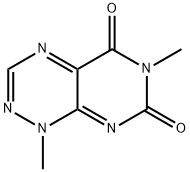Uses
Toxoflavin is a distinctive yellow pigment produced by some species of Pseudomonas and Streptomyces. Toxoflavin is one of two toxins produced when a fermented coconut drink, Tempe bonkrek, is contaminated with P. cocovenenans. Toxoflavin (PKF 118-310) is a potent antagonist of Tcf4/b-catenin signalling, inhibiting the expression of survivin and inducing apoptosis in several tumour cell lines.
Definition
ChEBI: Toxoflavin is a pyrimidotriazine that is 1,6-dimethyl-1,5,6,7-tetrahydropyrimido[5,4-e][1,2,4]triazine with oxo groups at positions 5 and 7. It has a role as an antineoplastic agent, a toxin, a Wnt signalling inhibitor, an apoptosis inducer, a bacterial metabolite, an antibacterial agent and a virulence factor. It is a pyrimidotriazine and a carbonyl compound. It is functionally related to a reumycin.
Biochem/physiol Actions
PKF118-310 is an antagonist of the Tcf4/b-catenin signaling. The compound disrupts the Tcf4/b-catenin complex and inhibits expression of Tcf4 responsive genes. PKF118-310 inhibits expression of survivin and induces apoptosis in HCC, colon tumor and lymphocytic leukemia cell lines.


